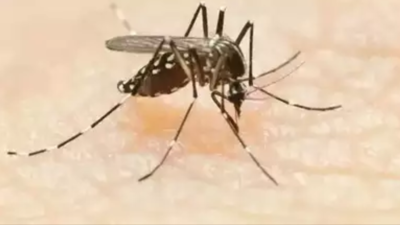Only 4 Pune Municipal Corporation wards report 50% of all dengue cases; officials call for caution

Image used for representational purpose only
PUNE: Half of all the confirmed dengue cases in the city this year have come from just four city wards, according to data from the Pune Municipal Corporation (PMC).
The Nagar Road-Wadgaonsheri ward, Aundh-Baner, Tilak Road-Sinhagad Road ward and the Hadapsar-Mundhwa ward have reported 127 confirmed dengue cases, out of the 254 cases recorded till August 20.
The four wards are among the largest in the city, and suffer from a range of problems, including waterlogging during the monsoon and accumulation of trash.
In fact, the Hadapsar-Mundhwa ward is a known dengue hotspot.
The least number of cases were reported from the Kondhwa-Yewalewadi Ward, which has registered only two cases.
Out of the 254 confirmed dengue cases, the Hadapsar-Mundhwa ward reported the highest - 34. It's followed by the Nagar Road-Wadgaonsheri ward (33), the Aundh-Baner ward (32) and Tilakroad-Sinhagad Road ward (28).
From January to August, the city areas have also reported 2,153 suspected cases of dengue. Dr Sanjeev Wavare, the PMC's assistant health officer, said the civic body is increasing surveillance.
"Hopefully, the number of dengue cases will go down as the rains recede. Dengue can be controlled if citizens ensure they don't have mosquito breeding sites in their neighbourhoods."
Prasad Katkar, assistant municipal commissioner of the Hadapsar-Mundhwa ward said, "Ours is the largest ward so cases are higher compared to other wards. We do conduct multiple drives to spread awareness and impose penalties."
The Nagar Road-Wadgaonsheri ward's assistant municipal commissioner, Somnath Bankar, said, "We have requested citizens to ensure there is no accumulation of water in drums, discard tyres or empty containers. We're finding mosquito breeding spots not only in slums but in high-rise buildings too."
Recently, PMC officials on house-to-house surveys said that in over 80% of dengue cases in Pune, the likely source of infection was the infected individual's home or housing society.
Larvae of the Aedes aegypti mosquito was found in parking lots and even in elevator ducts, the officials said.
The Nagar Road-Wadgaonsheri ward, Aundh-Baner, Tilak Road-Sinhagad Road ward and the Hadapsar-Mundhwa ward have reported 127 confirmed dengue cases, out of the 254 cases recorded till August 20.
The four wards are among the largest in the city, and suffer from a range of problems, including waterlogging during the monsoon and accumulation of trash.
In fact, the Hadapsar-Mundhwa ward is a known dengue hotspot.
The least number of cases were reported from the Kondhwa-Yewalewadi Ward, which has registered only two cases.
Out of the 254 confirmed dengue cases, the Hadapsar-Mundhwa ward reported the highest - 34. It's followed by the Nagar Road-Wadgaonsheri ward (33), the Aundh-Baner ward (32) and Tilakroad-Sinhagad Road ward (28).
From January to August, the city areas have also reported 2,153 suspected cases of dengue. Dr Sanjeev Wavare, the PMC's assistant health officer, said the civic body is increasing surveillance.
"Hopefully, the number of dengue cases will go down as the rains recede. Dengue can be controlled if citizens ensure they don't have mosquito breeding sites in their neighbourhoods."
Prasad Katkar, assistant municipal commissioner of the Hadapsar-Mundhwa ward said, "Ours is the largest ward so cases are higher compared to other wards. We do conduct multiple drives to spread awareness and impose penalties."
The Nagar Road-Wadgaonsheri ward's assistant municipal commissioner, Somnath Bankar, said, "We have requested citizens to ensure there is no accumulation of water in drums, discard tyres or empty containers. We're finding mosquito breeding spots not only in slums but in high-rise buildings too."
Recently, PMC officials on house-to-house surveys said that in over 80% of dengue cases in Pune, the likely source of infection was the infected individual's home or housing society.
Larvae of the Aedes aegypti mosquito was found in parking lots and even in elevator ducts, the officials said.
FOLLOW US ON SOCIAL MEDIA
FacebookTwitterInstagramKOO APPYOUTUBE
Start a Conversation
end of article










